- Home
- Brand, Max
Silvertip's Strike Page 11
Silvertip's Strike Read online
Page 11
“Why didn’t you say so before?” he yelled. “I got a good mind — ”
“You got a good mind to back up, and that’s what you’re goin’ to do,” said an unshaven brute, swaying to his feet from beside the fire.
Waring turned and raised one hand.
“Stop!” he commenced. “Brick, take that dynamite back from the fire.”
“Brick,” who had just risen ready for fight, snarled under his breath, but he picked up the tarpaulin and carried it to a crevice between two of the rocks.
“The point is,” said Waring, “that we’ve got this fellow Farrel on our hands, and Jim Silver ready to poison us somewhere in the open, loose and freehanded! Silver’s enough to have on the mind. And you have to tell me if Farrel can be handled.”
“He can’t be handled,” said Rutherford, still counting. “He’s one of the fools who prefer to be honest if they have to die for it.”
“He’s the kind of a fool,” broke in Delgas, “that wants to do something noble. That’s the kind that he is.”
And Farrel knew that he was listening to his death sentence.
CHAPTER XVIII
A COOL BIRD
One man more than those who could be counted around the fire had heard the last speech. That was Jim Silver, who had fled from the warning sound of the shot as he rode toward the signal smoke, and who had rounded through the upper shoulder of Mount Humphreys and come down again toward the face of the herd that was now in full view, sweeping into the valley.
Farrel was gone, that was clear. His own single pair of hands could probably do nothing; but, nevertheless, he did not turn back or ride for help in the town. He kept on toward the perils of one more “last chance.”
A long, sharp-sided ravine gave him a good slant toward the head of the valley. When he came out of that ravine, he was low down the slope and he could see the fluttering of the firelight among rocks at the base of the hill.
Therefore, he left the great stallion behind him and came on foot, worming his way here and there, never knowing when the upthrust of a hand of fire might show him to hostile eyes. And sometimes it seemed to Silver, as he came in closer, that the light was focused upon him out of a lantern, and that eyes were fixed upon him. It seemed as though voices were raised in laughing mockery while he drew nearer. Guns must be watching him. Fingers must be curling contentedly around the polished curve of triggers.
But he came on up until the blackness of the shadows at close hand shielded him from the light of the fire, and there was only the moon to consider. That was comparatively simple, because the shadow of the next hill now sloped across half of the rock nest inside of which the fire was burning. That was why Silver was able to draw so very close up to the point of danger and of interest.
He had arrived in time to see and hear all that had recently passed. He had had the uncomfortable experience of seeing the sack of dynamite placed right before the spot where he cowered. He used it, afterward, as a better cover which enabled him to draw nearer.
So he heard the death sentence passed on Farrel, in simple words.
“Look, Farrel,” said Sam Waring, striding suddenly up to the prisoner. “Don’t you go and be a fool. You come along with us. I’ll take care of you. You come along with me. I’ll give you a regular split in the job. I’ll take care of you. I don’t want the blood of any kid on my hands.”
“It ain’t any good,” argued Delgas. “There we had him tied and gagged and stretched all out, and the fool, he wants to be noble and kicks my gun and makes it go off and scare away that bird, Silver. A gent that wants to be noble,” said Delgas, “ain’t any use to birds like us. You know that, Sam.”
“Shut up, Morrie,” said Waring. “I know plenty. I’m asking the kid. It’s up to you, Danny. Will you play with us?”
Silver risked being seen, as he lifted his head to stare into the face of Farrell. That face was puffed and blood-streaked. It was set, too, in hard lines of endurance. The eyes glistened as Farrel stared back at Waring.
“We’ve all gotta die once,” said Farrel.
“Oh, hell!” said Waring, turning on his heel.
He threw up his hands, as though to ask the world’s attention to the effort that he had been willing to make on behalf of this young fool.
“I told you,” said Delgas.
“Yeah, you told me,” said Waring. “I wouldn’t believe anybody’d be such a fool. Look here, Danny!”
He whirled and faced Farrel again.
“Everybody’s laughing at you, you half-wit,” said he. “Don’t hold out on us, Danny. Come in and play the game, will you? What’s the matter with you?”
“He’s nuts about a girl that cooks back there on the ranch,” said Delgas. “Look at, kid,” said Delgas, stepping suddenly close to Farrel. “She don’t care about you. She was only givin’ you a play, that’s all. She’d pick up anybody. She give me the sweet eye, is what she done. She’s just stringing you along.”
“You lie!” said Farrel.
“You see?” said Delgas, stepping back and turning his hands palms up. “He’s goin’ to be noble, that’s all. He’s nuts about the girl, and he’s goin’ to be noble. She’ll be married to some other sap about a week after the coyotes finish lickin’ his bones, but he’s goin’ to die noble and believe in her to the finish.”
“Shut up, Morrie,” commanded Waring again. “Let me talk to him. Listen to me, kid, will you?”
Farrel looked straight a Waring and said nothing.
“I’m giving you a break,” said Waring. “Wake up to it, hombre. I’m giving you a break, and you don’t know it. Will you take a hand in our game?”
“Thanks,” said Farrel.
“Thanks what? Yes, or no?”
“Thanks — no,” said Farrel.
The hair prickled on the head of Jim Silver, as he heard that. He took out both revolvers and made his calculations. There was plenty of cover all around. He might get two or three of them before the rest were out of sight. He might even let Farrel have a chance to get to him. But after that?
Well, after that, they’d be done for. Nothing could save them — not when fellows like Delgas and Waring and Rutherford were around. For all the pretended strength of his hatred for blood, Waring was the sort of a marksman who cannot miss, and Silver knew it very well.
It was not of Rutherford’s pale face that Silver thought most, now. It was of the bucktoothed smile of Steve Wycombe, his upper lips caught and hanging. That was the way he must be smiling now. For it began to look a good bet that all the men he wanted to get would go down — Rutherford, Delgas, and Jim Silver, all three.
Decent men, it seemed to Silver, have fewer brains than rascals. Otherwise, such an inspiration could never have come into the head of Steve Wycombe.
“You won’t play with us?” repeated Waring.
“He won’t,” said Delgas. “He’s scared stiff, and he’s dyin’ on his feet with fear; but he’s gotta be noble, the sucker! Give him the works and get rid of him, will you?”
“You talk as if you’d like the job,” Waring said. “Take it, Delgas. I give you my share in him.”
“Am I goin’ to stick pigs for you, Sam?” demanded Delgas. “Since when, I’d like to know!”
“All right,” said Waring. “It’ll have to be fixed some way. One of my boys will turn the trick, I suppose. Too bad, though, because he’s a pretty good kid.”
“Sam,” said the voice of Rutherford.
“Keep your eye on Farrel,” said Waring to the man called “Brick.”
“He needs plenty of watching. One fellow like that, loose in the world, could spoil my future for me.”
“Your future’s like a fish a week out of water,” said Brick gloomily, but he took up his post beside Farrel.
“What is it, Harry?” Waring was asking, while Silver breathed more easily for the moment.
He began to cudgel his brains. He had a conviction that, no matter how tight the pinch, no matter how hopeless a situation might be, t
here was always some way of solving it, some way of cutting the Gordian knot. Now he felt fairly baffled, but baffled he must not be.
He began to strain his wits. Then he told himself that ideas would not come in that fashion. Instead, he must lie still, passively, and wait for whatever would come to him. So, little by little, he relaxed.
There was a promise that he might gain a little time, for Rutherford and Waring were wrangling hotly.
“Sorry, Sam,” Rutherford said. “Looks as though you’re just fifty-seven hundred dollars short in the payment.”
“Hey!” shouted Waring, starting violently.
Rutherford was not in the least moved. He lifted his pale face and studied Waring with a calm interest.
“What you mean by fifty-seven hundred short?” demanded Waring.
“I mean five thousand and seven hundred dollars and no cents,” said Rutherford. “I mean that money’s short.”
“It was in the pile when I handed it to you,” declared Waring.
Very gradually a smile spread over the features of Rutherford. He shook his head.
“It was in the satchel when I handed it to you,” said Waring.
Rutherford kept on smiling.
“What the devil’s the matter, Harry?” asked Waring “You don’t think that I’d try to cheat you, do you?”
“You know, brother,” said Rutherford, “that we all look for a little inside profit. You wouldn’t call it stealing.”
“Why, Harry,” said Waring, “I’m kind of shocked by this here. It couldn’t be that Ferris would ‘a’ hooked a handful of dough out of that satchel, could it? You don’t really mean that the coin’s missing, though? You’re just laughin’ up your sleeve at me.”
Rutherford continued to smile.
“When you get through talking, Sam,” said he, “just grab the extra cash and hand it over.”
“You don’t understand,” said Waring. “Where would I get that much loose cash out of a crowd like this? Every bean that I’ve got is right in there. But I’ll see you in a couple or three days.”
“I won’t be around,” said Harry Rutherford. “But don’t you worry about the extra money, Sam.”
“No? Thanks,” said Waring. “I knew you wouldn’t try to hang up a deal like this on account of a measly little five or six thousand. I’ll fix it with you, one day, as straight as a road.”
“Of course you will,” said the quiet voice of Rutherford. “You’ll fix it now. I’ll just take that big rock you wear in your necktie, brother.”
“I’m not wearing that diamoned now, Harry,” said Waring.
“Not at your neck in the bandanna,” agreed Rutherford. “You have it pinned under the lapel of your coat.”
“What?” exclaimed Sam Waring. “How did you — ”
He broke off his protesting argument and shouted with laughter.
“Hey, but you’re a cool bird, Harry,” he said. “Did anybody ever put anything over on you?”
“Not one, except Steve Wycombe, and he’s wearing the scars of the good turn he did for me. Let’s see the hard cash, brother.”
“Sure,” said Waring.
And the brazen cheat instantly pulled out a wallet and counted the extra cash into the hand of Rutherford.
CHAPTER XIX
STAMPEDE
By this time, clouds of dust raised by the milling cattle were pouring in rapid drifts across the camp fire, turning into grit the food which the men were eating, scumming across the surface of the coffee. All complexions became gray in a moment. It was a fog, and not a thin fog, that surrounded the fire and that made the moon dim.
Silver, with the razor edge of a knife, slit the tarpaulin that covered the dynamite. Inside was a quantity of sawdust; inside the sawdust lay the corded sticks of the explosive, each one carefully wrapped. He took out half a dozen of them, short lengths, and found a quantity of fuse, also. That was what he wanted. He hardly dared to look at Dan Farrel, in the meantime, for the moment of Dan’s death was close at hand, plainly.
He heard Red make a feeble protest.
“This here is a fellow that would keep his mouth shut,” said Red. “You could trust him, Waring. If he said he wouldn’t talk about you, he’d keep his word.”
Waring went up to Red and laid a fatherly hand on his shoulder.
“My dear young feller,” said Waring. “You’re just in the make and you ain’t finished, yet, or else I’d be bothered about you. I’d say that maybe you had a lot to learn about the way folks act when they’re under temptation.
Now, you take young Farrel here. I’d say that he’s a fine lad and an honest lad and a lad that means well, but I wouldn’t be able to tell what he might do after givin’ us his word here. He might be tempted — ”
Here Farrel broke in, his voice dry and harsh: “If I ever had a chance to hang the whole crew of you, I’d do it. I’d give my life to do it.”
The words fell like a blow on Jim Silver. He barely heard the voice of Waring continuing: “There! You can see for yourself what things are like. You can see for yourself that he ain’t the sort of a fellow that would make a nice, reasonable bargain, is he?”
“I dunno,” said Red. “I’m kind of sick, is all I know.”
That was the last that Silver heard as he withdrew like a snake among the rocks. The sweeping of the dust from the herd covered him, and the thickness of the uproar of clashing hoofs and horns, the pounding, the bellowing seemed to conceal him under a blanket of noise. The sound of a cataract draws down all eyes into it, and in the same manner, perhaps, all looks would be centering now upon the milling of the herd.
So he took chances of being seen as he hurried back toward the stallion. At any moment, even in a few seconds after he turned his back on the camp-fire scene, the thrust of a knife or the explosion of a gun might be the end of Farrel.
If Farrel died, he swore that he would spend the rest of his days tracking down every man who had appeared around that fire. But all that quantity of revenge would not bring back life to Danny Farrel or ease the heart of the girl who had sent him away to do his duty on this night.
So Silver worked with frantic haste, as he kneeled beside Parade, at last, attaching to each of the dynamite sticks a fuse of the length he had decided upon. He had three sticks and three fuses, each a little longer than the other, when he finally mounted. He proposed to save Farrel, if he could, not by shooting down the men who stood around him — there were too many of these — but by sweeping the whole gang away in the current of an action that promised to carry out from their hands the entire profits of the adventure on which they had embarked.
So he rode Parade right down the gulley to the point where it shelved off to meet the valley floor and the sweeping dust clouds which drove up above the herd and circled in the light wind toward the moon. He was doubly glad of that screen of dust now.
Closely as he harkened, he had not distinguished the sound of a gun during the interim. Perhaps Rutherford and Delgas and Waring were patching up the last details of their agreement; perhaps they intended to wait until the final moment before the herd was pushed up into the hills before they killed Dan Farrel and left him on the ground to be battered by the trampling hoofs beyond all recognition.
Silver scratched a match.
“Hey, Ferris, is that you?” yelled a voice not far away. “Cut in there and do your bit! Climb into it, kid!”
Silver touched the flame of the match to the ends of the three fuses, one quite short, the others longer. He had three portions of death in his grasp then. Even Parade, steel-nerved under most circumstances, now began to dance uneasily as he saw the sparkling blue fire run sputtering up the fuses.
Silver, with a yell, drove the stallion straight at the herd.
Off to his right, he saw a rider phantom-gray in the dust, and heard the man cursing with bewildered surprise. The sweep of the outer flank of the milling cattle came into clearer view. He saw the dull sheen of their eyes, the tossing of the horns like crook
ed spears continually stabbing at the air, and full at the mass of them he threw the dynamite with the shortest fuse attached.
It had seemed to him that he had waited until the fire was fairly kissing the dynamite, and yet there was no uproar of an explosion. Instead, the dynamite rolled under the feet of the first steers and was instantly out of sight.
He turned the stallion, with a groan, to try again farther down the head of the crowding cattle. Then, behind him, he heard the explosion and felt the weight of it in the air about him, a soft and ponderous blow that made Parade leap like a hare.
Glancing back, he could see several of the steers down, struggling. Those poor, mangled creatures would never rise again. But from about them the rest of the cattle were pressing back, throwing up their heads, trying to climb over the backs of the steers which still were surging up from the depths of the valley. It seemed to Silver that he had done no more than throw a bucket of water against the sweep of a sea, so small was the reaction.
But he went on, yelling like a fiend.
The second fuse had burned short. He set his teeth, counted three, and flung it. It burst in the very air, flattening several animals. He went on and cast the third stick far over against the farther side of the valley’s head, into the thick of the steers.
Again some of the poor creatures went down. But the rest were turning rapidly to escape these thunderbolts. With a frantic bawling the entire front of the herd wheeled and pressed back. It was slow work. The mass of the cattle remained before the terrified vanguard, a living wall against retreat unless the panic should spread to them.
Right and left, now, Silver saw riders making toward him. He heard the shouting of the many voices. He thought he could make out the tremendous uproar of Delgas above the rest, thundering like a wounded bull.
For his own part, Silver was pushing close in behind the van, close into the stifling fog of dust through which he was only vaguely aware of the twisting, swirling masses of confused backs, and of swaying horns. It made him dizzy, like looking into the fling and leap of water as it runs down a cataract.
He shouted; he yelled; he fired guns in the face of any beast that chanced to turn back toward him. Far before him, he could hear the rear guard of cow-punchers shooting their Colts to keep the cattle near them from turning in a stampede.

 Alcatraz
Alcatraz the Long, Long Trail (1923)
the Long, Long Trail (1923)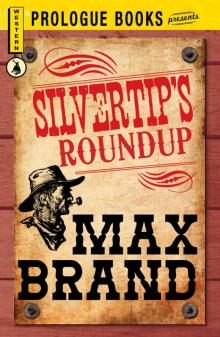 Silvertip's Roundup
Silvertip's Roundup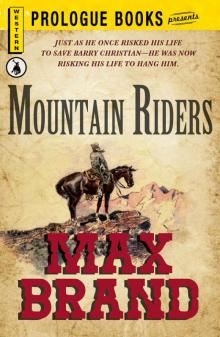 Mountain Riders
Mountain Riders Silvertip (1942)
Silvertip (1942)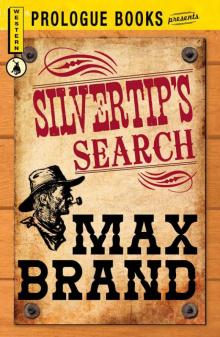 Silvertip's Search
Silvertip's Search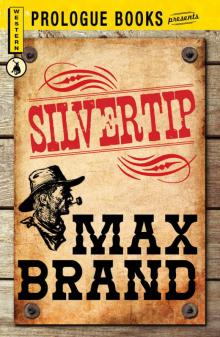 Silvertip
Silvertip Bull Hunter
Bull Hunter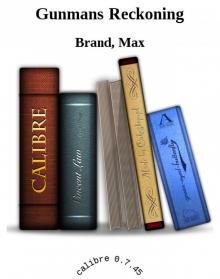 Gunmans Reckoning
Gunmans Reckoning The Seventh Man
The Seventh Man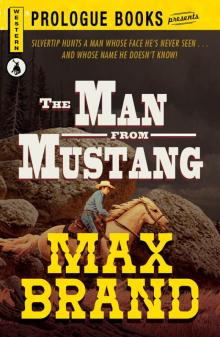 Man From Mustang
Man From Mustang Riders of the Silences
Riders of the Silences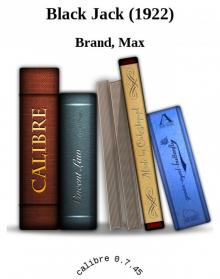 Black Jack (1922)
Black Jack (1922) Way of the Lawless
Way of the Lawless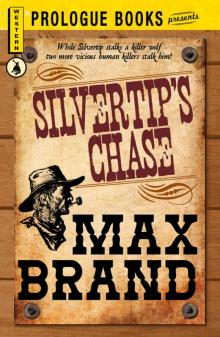 Silvertip's Chase
Silvertip's Chase Trailin
Trailin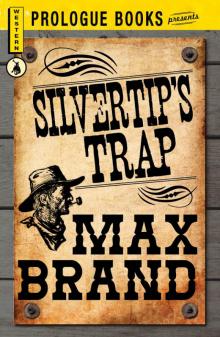 Silvertip's Trap
Silvertip's Trap Ronicky Doone (1921)
Ronicky Doone (1921) The Night Horseman
The Night Horseman the Garden Of Eden (1963)
the Garden Of Eden (1963)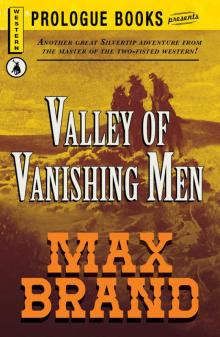 Valley of the Vanishing Men
Valley of the Vanishing Men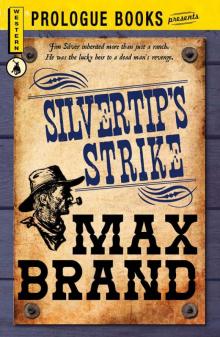 Silvertip's Strike
Silvertip's Strike Black Jack
Black Jack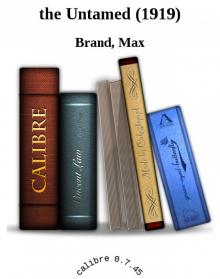 the Untamed (1919)
the Untamed (1919) Way Of the Lawless (1921)
Way Of the Lawless (1921) The Untamed
The Untamed